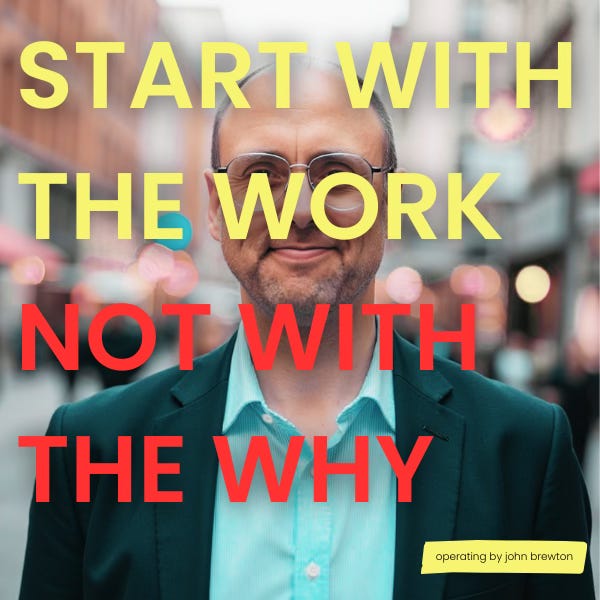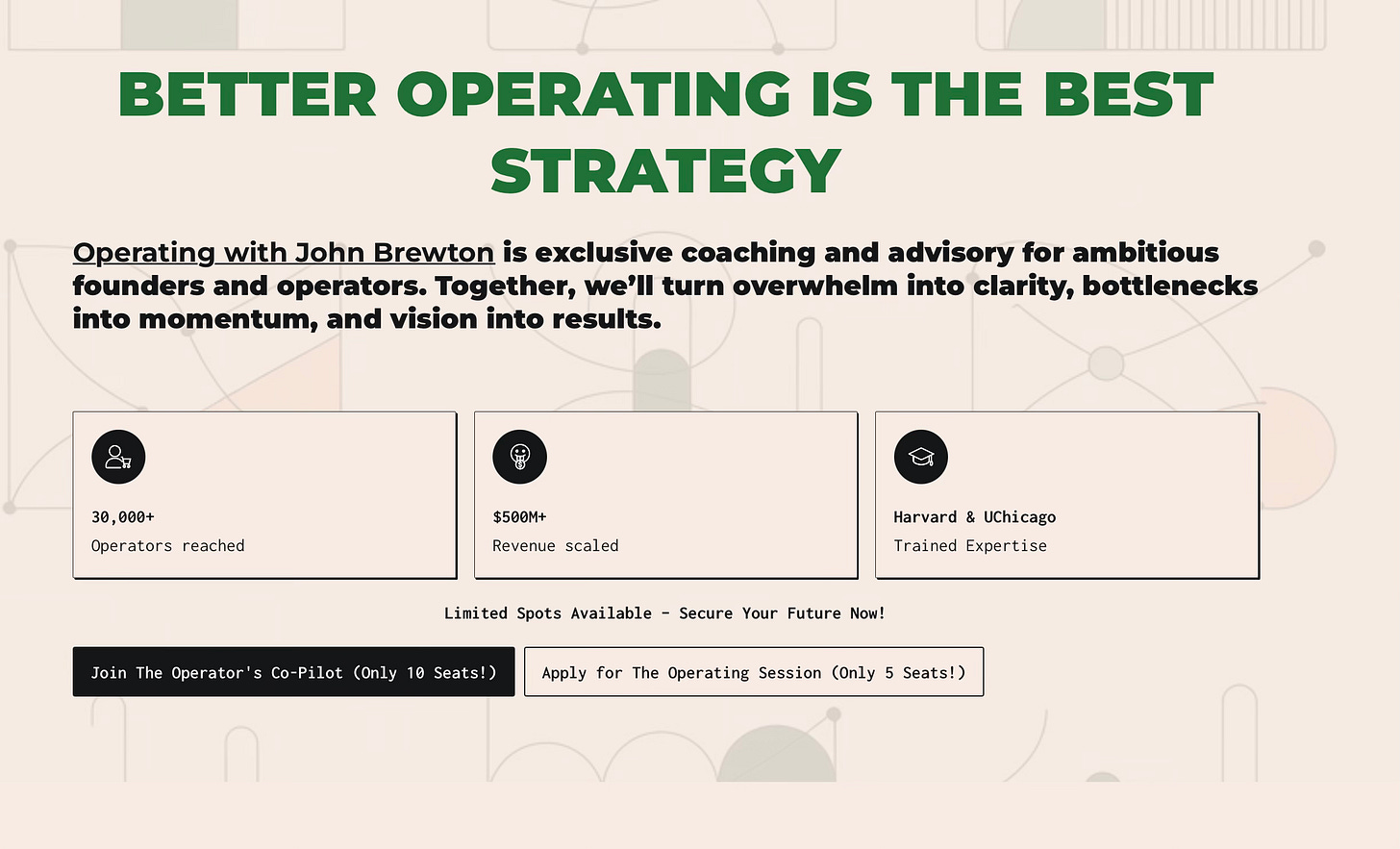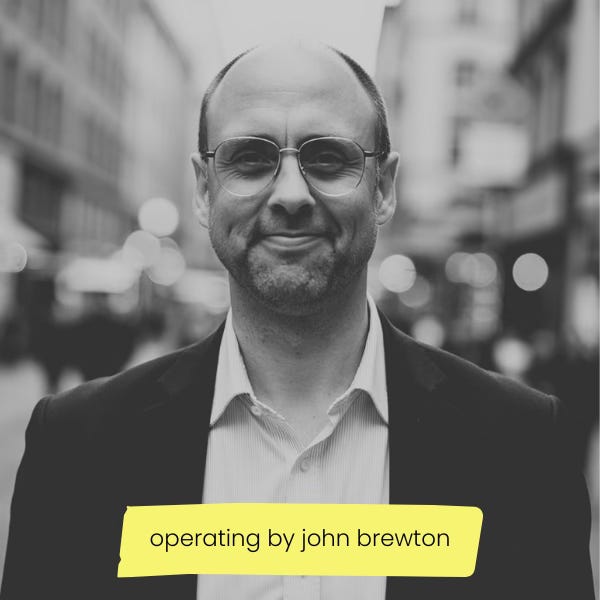Start With The Work, Not The Why
Why Becoming Skilled Is More Important Than Chasing Passion
New to Operating? Check out these reader favorites:
Introduction
I wanted to believe in Simon Sinek. I read Start with Why, absorbed the TED talk, and felt an immediate conviction to find my Why. The idea that purpose should be the starting point felt noble and romantic. It fit with my beginnings as a musician and artist before I fell for economics, competitive strategies, and operating chess matches. When I started, creativity and passion drove me.
Until that didn’t work. Until I opened a cafe five days a week, folded stacks of denim and Favorite-T’s at the Gap, taught drum lessons, and made a pittance gigging to pay my rent. So I sold out.
I got to work on my first degree, studied economics, discovered business strategy, and learned that my skills pulled me in the opposite direction of where I thought my inspired heart was meant to be. The market rewarded my ability to analyze, design processes, and operate companies. Over two decades, I built a set of academic and business credentials and accomplishments, studied efficiency systems, and immersed myself in the disciplines of business economics and operations. I did the work because I was good at it, got paid for it, and slowly built a life that made me happy.
It wasn’t until the company I had spent 13 years operating and building was sold that I found the space to reflect on purpose. By then, I had earned the privilege to ask “why.” And the truth was obvious: purpose didn’t precede competence; it followed it. The meaning I now find in my work comes from having built the skills, structures, and experience that made me valuable in the first place.
That is why I’m pushing back against the “start with why” mantra. It’s backwards. Purpose without competence collapses. Skills, execution, and operating clarity create the foundation on which meaning can rest. If you want to build a career or a company that lasts, don’t start with why. Start with the work. Be patient with the work. The “why” will become clear. I promise.
Why the “Why” Fails Without the Work
The evidence does not support purpose as the lever to pull first. Studies on how interests form show that people who believe passions must be discovered tend to drop difficult pursuits quickly; those who see interests as developed persist longer and acquire skill. Purpose is fragile if it rests on a “fixed” theory of the self. It strengthens when built on the compounding effects of practice, feedback, and improvement.
Harvard research offers three sober points:
Passion is usually developed through engagement, not found in advance.
Passion fluctuates. It makes a poor foundation for multi-year commitments.
Passion can mislead. Untethered enthusiasm produces bad choices when it outruns judgment.
By contrast, competence produces a steadier resource: confidence grounded in capability. Over time, that confidence becomes a better substrate for purpose.
Angela Duckworth’s research on Grit reinforces the sequence. High performers distinguish themselves by sustained effort toward a clear task, not by early enthusiasm. Consistency across months and years, not intensity in bursts, explains outcomes. The implication for operators is simple: build the machine, then narrate it.
Long-horizon studies introduce an economic reality check. In one 11-year panel, conducted by Dr. Daniel Heller at Tel Aviv University, of aspiring professionals, stronger “callings” predicted entry into the field more than measured talent, yet earnings lagged peers who kept the work as a side pursuit. Meaning can be real, and still be expensive.
The ability to finance purpose often arrives only after competence produces surplus.
The social context matters. Access to passion is not evenly distributed. For many, “follow your passion” is luxury advice. Researchers describe a growing “passion inequality”: security enables risk-taking, not the reverse. Wealth and slack time let people explore; most workers need wages first. The sequential model fits both the data and common sense:
skills → autonomy → purpose
Nuance also matters inside teams. Psychologists distinguish harmonious passion (integrated, sustainable) from obsessive passion (consuming, conflict-creating). Passion can be contagious and motivating, and it can also raise costs through pressure and burnout. Competence moderates the risk by turning energy into output and providing boundaries for effort.
Elite institutions and employers behave accordingly:
Harvard emphasizes purpose over passion only after rigorous skill-building.
Wharton teaches values clarification, then pairs it with practical capability.
McKinsey, BCG, and Bain recruit for demonstrated effort and train for craft, treating themselves as skill incubators more than destinations.
Tyler Cowen’s market view points the same way: develop comparative advantage and let prices guide you. Scott Galloway’s wealth studies add the blunt corollary: capital makes room for passion; passion rarely creates capital on its own.
The synthesis is clear:
A durable career and a durable company follow a sequence: build rare and valuable skills; use them to gain autonomy and control; articulate purpose once impact is real; let passion emerge from mastery. Purpose is strongest as an output of competence, not as its substitute.
Operating History
Economists and business historians have long described this order. Ronald Coase explained firms as cost-minimizing structures, not story factories. His insight reframed companies not as vehicles for inspiration but as mechanisms to lower the cost of doing business. Efficiency, not narrative, explained why firms exist in the first place.
Alfred Chandler expanded this understanding by demonstrating that structure follows strategy, and strategy follows work. Markets, assets, and bottlenecks dictated the path companies took, forcing leaders to respond to realities rather than ideals. His historical analysis showed that organizations grew in response to the operational challenges in front of them, not because of abstract visions.
Andy Grove refined these lessons for the modern era. He insisted that managers cannot delegate understanding, and he used the metaphor of the breakfast factory to show why. The three-minute egg revealed that every process has a constraint, and the job of the operator is to identify it, design around it, and only then communicate a direction.
Across these lenses, purpose follows performance. It is earned by consistent delivery, not granted by proclamation.
Toyota: Toyota’s articulation of “The Toyota Way” was not a stroke of branding genius but a codification of decades of kaizen and just-in-time practices. Its real innovation was the disciplined elimination of waste and a culture of continuous improvement. Only after this foundation was built did Toyota elevate its mission to include broader ideas of mobility and sustainability. Its purpose became credible because it rested on proven excellence.
Bridgewater: Bridgewater’s famous “radical transparency” was never a starting slogan. It emerged from years of recording decisions, refining feedback systems, and embedding knowledge in daily routines. By the time the cultural narrative took shape, the practice of documenting and stress-testing ideas had already produced performance. Its purpose grew naturally out of a deeply engineered system of execution.
Amazon: Amazon’s “customer obsession” looks like a purpose statement, but in truth it functioned first as an operating principle. Jeff Bezos insisted on metrics that tracked defects, reduced cycle times, and expanded selection at lower cost. Only later was this obsession articulated as a mission. Amazon’s purpose was simply a description of what its systems had already achieved.
In a generative-AI environment, narrative is cheap and instantaneous. What remains scarce is translation: from tool to workflow, from workflow to measurable output. The companies that win will write less about their reason for being and spend more time making the work legible, repeatable, and improvable.
Implications for Founders and Operators
For Individuals: Treat passion as an emergent property, not a starting compass. Research on fixed versus growth theories of interest shows that persistence matters more than discovery. Building career capital, rare and valuable skills that the market rewards, creates the conditions for autonomy. Harvard and Wharton’s findings reinforce this: purpose emerges once skills and values align, not before. Purpose will harden as mastery grows and confidence compounds.
For Companies: Design the work first and let purpose reflect what systems achieve in practice. Alfred Chandler’s historical analysis showed that strategy follows the reality of markets, resources, and bottlenecks, not grand statements. Andy Grove’s insistence on identifying the constraint underscores the same point: execution precedes vision. Companies that document their workflows, embed feedback loops, and codify learning, as Toyota and Bridgewater did, can later articulate a “why” that resonates because it reflects lived competence.
For the AI Era: Resist the temptation to substitute vision for velocity. Generative tools can spin slogans instantly, but they cannot replace coherent workflows. Studies on failed AI transformations reveal that 95% of pilots stall because organizations cannot integrate systems into operating routines. The firms that win will build workflows that withstand the pressure of automation, then describe the mission those workflows make possible. In this environment, vision is cheap; disciplined execution is scarce.
Operating Takeaways
To close the argument, it helps to distill the research and examples into operating lessons. Operators and founders don’t just need philosophy; they need sequence, discipline, and reminders that can guide daily execution. The following takeaways translate the argument into practice.
✅ Start with competence, let purpose follow. Purpose is durable when it rests on a foundation of skills, systems, and market-tested performance.
✅ Treat work as experimentation. The firm itself exists to reduce friction and test what belongs inside versus outside its boundaries. Every operating decision is a live experiment.
✅ Build focus as infrastructure. Strategy is executed through sustained attention, not constant motion. Deep work is the hidden operating advantage.
✅ Document as you go. What gets documented gets embedded. Organizational memory compounds learning and creates the conditions for scale.
✅ Use technology to amplify discipline, not replace it. AI will expose weak systems and reward well-designed ones. Operational excellence is now a precondition for transformation.
Concluding Thought
Don’t start with why. Start with the work. Competence produces confidence. Confidence enables autonomy. Purpose becomes durable, an effect of mastery rather than a story in search of results
Suggested Reading
Andy Grove, High Output Management
Alfred Chandler, Strategy and Structure
Cal Newport, So Good They Can’t Ignore You
Clayton Christensen, The Innovator’s Dilemma
Scott Galloway, The Algebra of Wealth
Tyler Cowen, Talent: How to Indentify Energizers, Creatives, and Winners Around the World
If you’d like to work together, I’ve carved out some time to work 1:1 each month with a few, top notch Founders and Operators. You can find the details here.
John Brewton documents the history and future of operating companies at Operating by John Brewton. He is a graduate of Harvard University and began his career as a Phd. student in economics at the University of Chicago. After selling his family’s B2B industrial distribution company in 2021, he has been helping business owners, founders and investors optimize their operations ever since. He is the founder of 6A East Partners, a research and advisory firm asking the question: What is the future of companies? He still cringes at his early LinkedIn posts and loves making content each and everyday, despite the protestations of his beloved wife, Fabiola, at times.





Very thoughtful and impeccable arguments. Passion comes from a craft well done, from society validating your worth, from being able to solve things, help others, etc. This reminded me of Maslow’s hierarchy of needs. You get to self-actualization (purpose) only after you achieve self-esteem. Self-esteem is achieved by gaining confidence. Gaining confidence is about doing a job well done and validated.
Excellent article, John! I really like the layout as well, it's different and it looks great.
This statement is simply awesome: "vision is cheap; disciplined execution is scarce."